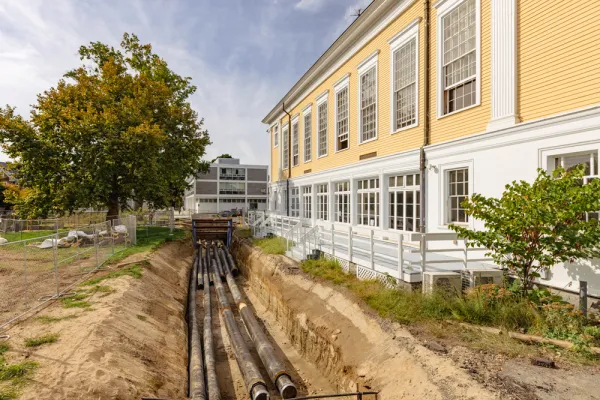Under Construction
Sustainability
Geothermal energy project picks up steam
Published September 30, 2022
The college’s cutting-edge project to convert its aging fossil-fuel-fired steam heating system into a state-of-the-art, electricity-fueled geothermal system took some big steps over the summer, moving Smith closer to achieving carbon neutrality by 2030.
Construction kicked into high gear shortly after Commencement in May, with crews focusing on installing distribution lines for the hot and cold water that will provide heating and cooling to buildings from the new energy plant, said Dano Weisbord, Smith’s associate vice president for campus planning and sustainably. The energy plant is to be located in the old Capen boiler building. Weisbord noted that the Capen building, originally constructed in 1896, housed a coal boiler that provided heat to what was once Miss Capen's School for Girls. It was acquired by the college in the 1920s.
Ongoing excavation and installation of piping will continue throughout the 2022–23 academic year, first behind Chase and Duckett houses and then toward Albright and Baldwin houses. Later in the year, the work moves to the Helen Hills Hills Chapel area. “This work has, and will continue to disrupt parking and walking paths,” Weisbord said. “The good news is that it does move. So, if you see it in one place one week, it may well have moved on [to another location] the next.” Updates about parking lot closures and other possible disruptions can be found on the project’s website.
Conversion work on the new Capen energy plant starts in early 2023, according to Robert Lambert, senior project manager. Overall, construction plans foretell a busy summer for 2023 in the north campus with the plant and building conversions happening concurrently with drilling and installation of some 70 wells off Prospect Street. “Each geothermal well will be approximately 800 feet deep,” Lambert noted, “and will connect back to the Capen plant for efficient heating/cooling of water that will flow to buildings through the distribution piping that went in this summer.”
The total project cost is $210 million, funded largely through proceeds from recent debt issuances. Work will be accomplished in three overlapping phases and is scheduled for completion in 2028. When completed, the geothermal energy project will make Smith one of only a handful of schools in the nation—and likely the first in New England—to achieve net-zero carbon emissions through the near elimination of on-campus fossil fuel combustion rather than through other means, such as carbon offsets or biofuel conversion.
Newly laid distribution pipes next to the Davis Center will transport water warmed and chilled by the earth in order to heat and cool buildings. Photograph by Jeff Baker
